|
|
|
Sort Order |
|
|
|
Items / Page
|
|
|
|
|
|
|
| Srl | Item |
| 1 |
ID:
193484
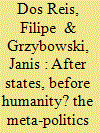

|
|
|
|
|
| Summary/Abstract |
In the debate on the (de-)judicialisation of international affairs and the International Criminal Court (ICC) specifically, the distinctions between legality and politics and between state sovereignty and the international remain contested. While realist and legalist approaches discuss the transformation of international politics by international criminal law, sociological and critical-legal perspectives instead highlight the politics of international criminal law. In this contribution, we focus on how the distinctions between (international) law and politics matter, not as substantively opposed spheres, but as boundaries that the ICC itself contingently and flexibly draws when considering particular situations. These meta-politics of invoking and reproducing key boundaries in seemingly technical elaborations of the interest of justice, the scope of its jurisdiction, or the application of complementarity reflect the Court’s particular authority but also its predicament of pushing for an international criminal law serving humanity, rather than states, while reproducing the distinctions between (international) law and politics. We illustrate the Court’s meta-politics by revisiting three recent decisions of the ICC to (not) investigate alleged international crimes committed by British forces in Iraq, by the Taliban, governmental, and US forces in Afghanistan, and by Israeli authorities and Palestinian groups in the West Bank, East Jerusalem, and Gaza.
|
|
|
|
|
|
|
|
|
|
|
|
|
|
|
|
| 2 |
ID:
170634
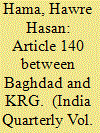

|
|
|
|
|
| Summary/Abstract |
The Iraqi state and the Kurds have always been at the odds over the territory around Kirkuk, particularly following the discovery of oil in the province in 1927. Both sides have claimed ownership of the province since that time and have sought to gain advantage over the other through various means. The region was subjected to a forced demographic change under the Arabisation policy during the reign of Ba’ath Party between 1968 and 2003. Following the overthrow of Saddam’s regime in 2003, the status of Kirkuk was to be constitutionally and peacefully resolved according to Article 58 of the 2004 interim constitution and then Article 140 of the 2005 permanent constitutions, which called for normalisation, a census, and a referendum in Kirkuk and other disputed areas to determine the will of their residents. Practically, however, various Iraqi governments and the two dominant Kurdish parties, the Patriotic Union of Kurdistan and the Kurdistan Democratic Party, were able to politicise implementation of Article 140. Although each blame the other, all share responsibility for the lack of implementation. This research investigates that experience and argues that the joint administration is the optimal scenario in the short run and independent region within the Iraqi state would be the best-case scenario in the long term.
|
|
|
|
|
|
|
|
|
|
|
|
|
|
|
|
| 3 |
ID:
180564
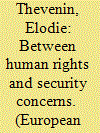

|
|
|
|
|
| Summary/Abstract |
For the past few decades, the increased perception of migration as an issue in Europe resulted in the development of the externalisation of the EU’s migration governance to third countries. EU-Turkey and EU-Libya cooperation frameworks on migration have in this perspective been established in the wake of the 2015 migration crisis and triggered major controversies. The agreements received fierce contestation from non-governmental and international actors, highlighting the poor protection of human rights through this management. This paper analyses the dynamics of politicisation of EU-Turkey and EU-Libya agreements on migration in domestic political discourse. A qualitative comparison between German, French and Polish parliamentary debates constitutes the main empirical basis of this research. The analysis focuses on the different patterns of politicisation with emphasis on contesting arguments. This paper examines members of parliaments’ stances on EU-Turkey and EU-Libya cooperation focusing on humanitarian and securitisation frames. Results demonstrate an uneven process of politicisation in national parliaments dependent on the robustness of parliamentary majority and political parties’ issue positions. Overall, the analysis of discourse on the two agreements clearly illustrates the prioritisation of security over human rights when it comes to migration management.
|
|
|
|
|
|
|
|
|
|
|
|
|
|
|
|
| 4 |
ID:
101011
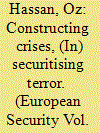

|
|
|
|
|
| Publication |
2010.
|
| Summary/Abstract |
The European Union's (EU) counter-terrorism strategy has been particularly dynamic, developing as a result of 'crises' and subsequent post-crisis narrations. The events of 11 September 2001, and the Madrid and London bombings have proved to provide moments of punctuation from which policy evolution and institutionalisation has followed. As a result of such crises, the EU has increasingly regarded terrorism as a direct challenge to the Union's role as a security actor and sought to institutionalise a diverse range of security governance technologies across its multiple pillars. Such an approach is noticeable for its qualitative difference compared to EU strategy pursued throughout the end of the twentieth century, and demonstrates an increased willingness for the EU to assert its role in the world. Yet, what is highly noticeable from the EU strategy and the proliferation of security governance technologies is the manner in which the EU has securitised 'terrorism' in the pursuit of internal, external and normative objectives. As a consequence, the EU has inflated the threat posed by terrorism, and increasingly attempted to 'Europeanise' its response. Evident in such a strategy however, is the manner in which counter-terrorism practices can generate greater insecurity inside and outside of the Union.
|
|
|
|
|
|
|
|
|
|
|
|
|
|
|
|
| 5 |
ID:
180559
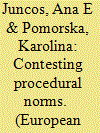

|
|
|
|
|
| Summary/Abstract |
While there is increasing evidence in the literature of politicisation in the area of European foreign policy, we know less about how this has affected the dynamics of cooperation among EU member states and, specifically, the procedural norms that govern this policy. This article is concerned with how politicisation and contestation manifest at the micro-level and how they might shape everyday EU foreign policy negotiations. It seeks to establish to what extent politicisation – resulting from the emergence of a new political cleavage centred around issues of identity and supranational integration – has driven normative contestation within EU foreign policy negotiations and whether this has led to the erosion of long-standing procedural norms in European foreign policy. Our findings suggest that despite CFSP Council committees being an institutional arena, characterised by intergovernmental, relatively insulated, and technical decision-making, current processes of politicisation linked to the rise of populism and the increasing transfer of authority to the EEAS have increased contestation of norms within this setting. However, procedural norms have remained relatively resilient to these challenges.
|
|
|
|
|
|
|
|
|
|
|
|
|
|
|
|
| 6 |
ID:
073841
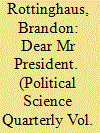

|
|
|
|
|
| Publication |
2006.
|
| Summary/Abstract |
BRANDON ROTTINGHAUS looks at an important but untold story of the origins, adaptations, and utility of public opinion mail sent to the White House as a political tool. He concludes that the apparatus for gauging public opinion by the mail predates but largely mirrors the institutionalization of opinion polling in the West Wing and serves as a valuable measure of opinion for presidents interested in understanding and managing public opinion.
|
|
|
|
|
|
|
|
|
|
|
|
|
|
|
|
| 7 |
ID:
122169
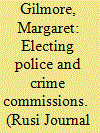

|
|
|
|
|
| Publication |
2012.
|
| Summary/Abstract |
In mid-November 2012, elections will be held in each police force area in England and
Wales, apart from London, for the post of police and crime commissioner. Senior police
officers suggest it will be the biggest shake-up since the first police force was established
by Sir Robert Peel in the early nineteenth century. The government believes the new PCCs
will empower local communities to decide policing priorities in their areas; critics fear
the move is politicising policing and may prove detrimental to national policing needs.
Margaret Gilmore investigates the challenges and the likely impact of this new approach
|
|
|
|
|
|
|
|
|
|
|
|
|
|
|
|
| 8 |
ID:
105274
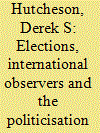

|
|
|
| 9 |
ID:
190901
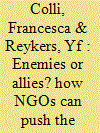

|
|
|
|
|
| Summary/Abstract |
This article examines the conditions under which non-governmental organisations (NGOs) gain access to defence administrations when campaigning for transparency around the use of military force. We theorise that gaining access in this traditionally secluded domain is a matter of supply and demand. NGOs can gain access through technical and political information, yet not without demand for these resources, dependent on the politicisation of concerns about the use of force. We focus on the activities of Airwars, an international NGO, and its campaign in the Netherlands (2015–20) to foster transparency about civilian casualties caused by Dutch airstrikes. Our analysis shows that their credible information about air strikes led to access to the defence administration and allowed them to effectively advocate for transparency, mediated by the politicisation of the issue through parliamentary and media attention. Our findings contribute both to the literature on NGO advocacy and to the field of civil-military relations.
|
|
|
|
|
|
|
|
|
|
|
|
|
|
|
|
| 10 |
ID:
127049
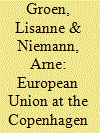

|
|
|
|
|
| Publication |
2013.
|
| Summary/Abstract |
This article analyses the extent of European Union (EU) actorness and effectiveness at the 15th United Nations Framework Convention on Climate Change (UNFCCC) Conference of the Parties (COP) meeting in Copenhagen in December 2009. Although the EU has been characterised as a leader in international climate policy-making for some time, the COP 15 meeting in Copenhagen has overall brought about disappointing outcomes for the Union. This casts doubts on EU actorness and effectiveness in this field. We take the article by Jupille and Caporaso as a conceptual point of departure and then specify a more parsimonious actorness framework that consists of coherence and autonomy. Effectiveness is conceptualised as the result of actorness conditioned by the 'opportunity structure', that is, the external context that enables or constrains EU actions. We hold that EU actorness was only moderate, especially given somewhat limited coherence. In terms of the opportunity structure, we argue that the strong involvement of other important actors with rather different positions adversely impacted on EU effectiveness, along with a high degree of politicisation that constrained the European Union's ability to negotiate effectively.
|
|
|
|
|
|
|
|
|
|
|
|
|
|
|
|
| 11 |
ID:
184582
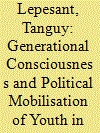

|
|
|
|
|
| Summary/Abstract |
This article is a contribution to theoretical reflection on the notion of generation applied to the study of youth in Taiwan. Starting from the polysemy of this concept, which has remained problematic for the social sciences since the nineteenth century, it shows that beyond the simple demographic cohort, the young people born in the 1980s and 1990s form a new “actual” generation, in the sense of Mannheim, i.e. characterised by objectively distinctive traits and a generational consciousness that contrasts with their elders. It also seeks to explain the process of formation of this generational consciousness and its implications for political mobilisation.
|
|
|
|
|
|
|
|
|
|
|
|
|
|
|
|
| 12 |
ID:
117910
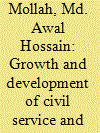

|
|
|
|
|
| Publication |
2011.
|
| Summary/Abstract |
The aim of this article is to analyse the growth and development of bureaucracy as an institution of government in Bangladesh from historical and politico-administrative perspectives. Although it is now an independent state, various Hindu kings, Muslim emperors, British lords and zamindars of the Indian subcontinent ruled the area of Bangladesh for several hundred years. In 1947, when India and Pakistan emerged as independent states, Bangladesh was a part of Pakistan. To understand the growth and development of bureaucracy in Bangladesh, the article is divided into two broad sections: the colonial legacy of both British India and Pakistan (1601-1971) and the Bangladesh period (1971-2008). The structure and working patterns of bureaucracy in Bangladesh are a legacy of British colonial rule, which impeded reform efforts after Independence and caused politicisation of the administration and governance. Civil-military elitisms reduced accountability of the administration, resulting in a dominating bureaucratic structure with corruption.
|
|
|
|
|
|
|
|
|
|
|
|
|
|
|
|
| 13 |
ID:
193170
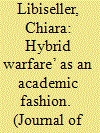

|
|
|
|
|
| Summary/Abstract |
The ‘hybrid warfare’ concept had been coined years earlier, but became fashionable only when it was adopted and adapted by NATO in 2014, after which academic interest suddenly sky-rocketed. Academics often adopted NATO’s understanding of the concept, took for granted its fit for Russian actions, and imported its political assumptions into the academic debate. The fashionability of the term also led to bandwagoning and thus superficial engagement with both the concept and the phenomenon it was applied to. This article outlines this process and its implications for the field of Strategic Studies.
|
|
|
|
|
|
|
|
|
|
|
|
|
|
|
|
| 14 |
ID:
192940
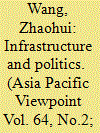

|
|
|
|
|
| Summary/Abstract |
The article seeks to understand the different types and sources of politicisation as well as the consequences for Belt and Road Initiative infrastructure projects. It is argued that while the personalised insulated type of foreign policymaking is conducive to intra-system politicisation, the institutionalised responsive type is associated with extra-system politicisation. While the former type is contingent on political turnovers and brings about abrupt shocks, the latter oftentimes generates societal pushback from socio-economic groups. The article focuses on two flagship Belt and Road Initiative infrastructure projects in Malaysia and Indonesia. Based on fieldwork interviews and process tracing, the article finds that the East Coast Rail Link project in Malaysia has suffered from high risk of political interruption owing to Malaysia's personalised insulated type of foreign policymaking, whereas the Jakarta–Bandung High Speed Rail project in Indonesia has encountered sustained obstacles from Indonesian society and brought about substantial delays under Indonesia's institutionalised responsive type.
|
|
|
|
|
|
|
|
|
|
|
|
|
|
|
|
| 15 |
ID:
180557
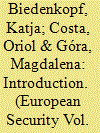

|
|
|
|
|
| Summary/Abstract |
Contestation and politicisation are two concepts of increasing relevance to European foreign and security policy (CFSP) scholars and practitioners alike. However, reasonable doubts can be raised as regards this growing literature: first, political conflict has always been part of CFSP, and national and European politics have traditionally been at the centre of research in this field. Second, exploring how the two concepts relate to European foreign, security and defence policies is complicated by the fact that foreign affairs more broadly do not meet all the criteria set by the literature on politicisation, which usually requires that some form of mass mobilisation takes place, or at least a high degree of salience. This article addresses these concerns by looking at the changing politics of CFSP. As the introduction to the special issue, we explore the hypothesis that contestation of European foreign, security and defence policy is now more in line with the broader way in which political conflict is being re-structured in Europe. If this is so, political conflict over CFSP will more easily be associated with issues that have an appeal beyond the narrow community of its practitioners and observers.
|
|
|
|
|
|
|
|
|
|
|
|
|
|
|
|
| 16 |
ID:
180563
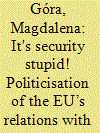

|
|
|
|
|
| Summary/Abstract |
The European Union’s security depends on how stable and peaceful its neighbours are, and yet the security situation around it has been deteriorating in recent years. The EU policies designed to stabilise the neighbourhood – the European Neighbourhood Policy (ENP) and EU enlargement – were originally designed as “low politics” of foreign policy focusing on economic instruments and tools of democratisation, but in time security became a prime concern. The article firstly shows how the European Parliament and national parliaments narrate these challenges in the neighbourhood and how security-related concerns become central to the ENP and enlargement. Secondly, in capturing the security concerns, it also shows how such changes contribute to the politicisation of relations with neighbours and how these processes differ between national and supranational level. Empirically, the politicisation of the ENP and EU enlargement in national parliaments (the UK, Poland and Ireland) and the European Parliament between 2004 and 2014 is compared and analysed.
|
|
|
|
|
|
|
|
|
|
|
|
|
|
|
|
| 17 |
ID:
148128
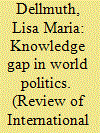

|
|
|
|
|
| Summary/Abstract |
The past decades have seen a significant expansion in the scope and authority of international organisations (IOs), raising questions about who participates and is represented in the public contestation of IOs. An important precondition for citizens to become critically involved in the public debate about an IO is that they are aware of the politics of that IO. This article sheds light on this largely unexplored issue, asking why some citizens are more aware of IOs than others. This question is examined in the context of a powerful international organisation, the United Nations Security Council. Using a multilevel analysis of citizens in 17 Asian and European countries, this article argues that citizen knowledge about the Council is shaped by economic conditions and cosmopolitan identity. Higher levels of knowledge are found among the wealthier, and there is some evidence that income inequality depresses knowledge among poorer citizens. Furthermore, citizens identifying with groups or individuals across nation-state borders are more likely to know more about the Council. The article sketches broader implications for the study of the politicisation of IOs and citizen representation in the public contestation of IOs.
|
|
|
|
|
|
|
|
|
|
|
|
|
|
|
|
| 18 |
ID:
118528
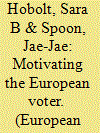

|
|
|
|
|
| Publication |
2012.
|
| Summary/Abstract |
Voters behave differently in European Parliament (EP) elections compared to national elections because less is at stake in these 'second-order' elections. While this explains the primary characteristic of EP elections, it has often led to a conflation of distinct motivations for changing behaviour - namely sincere and protest voting. By distinguishing these motivations, this article addresses the question of when and why voters alter their behaviour in EP elections. In addition, it argues that the degree of politicisation of the EU in the domestic debate shapes the extent to which voters rely on EU, rather than national, considerations. These propositions are tested in a multilevel analysis in 27 countries in the 2009 EP elections. The findings have important implications for understanding why voters change their behaviour between different types of elections.
|
|
|
|
|
|
|
|
|
|
|
|
|
|
|
|
| 19 |
ID:
142202
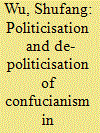

|
|
|
| 20 |
ID:
180558
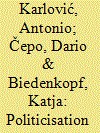

|
|
|
|
|
| Summary/Abstract |
This paper examines the response of the members of the European Council towards the EU’s sanctions policy against Russia following the 2014 Russian occupation and annexation of Crimea and the continued Ukraine crisis. The case is analysed to answer the question on the traits of the politicisation of the EU’s Russia sanctions policy. Concretely, the main research question is: what does the interplay of actor range, salience, and polarisation tell us about politicisation of CFSP in the case of sanctions policy? The secondary research question deals with how actors interact when contesting a sanctions policy to boost their success. Considering that the European Council, as the main actor in CFSP, is something of a “black box”, the paper heuristically focuses on statements (N = 223) on the sanctions policy given by its members from March 2014 till the end of 2019. The analysis shows how the politicisation of the sanctions policy seemingly entrenched itself into EUFP politics after it skyrocketed and fell in the wake of Russia’s annexation of Crimea. Finally, a latent class analysis indicates the existence of two latent coalitions with opposing views on the sanctions policy.
|
|
|
|
|
|
|
|
|
|
|
|
|
|
|
|
|
|
|
|
|